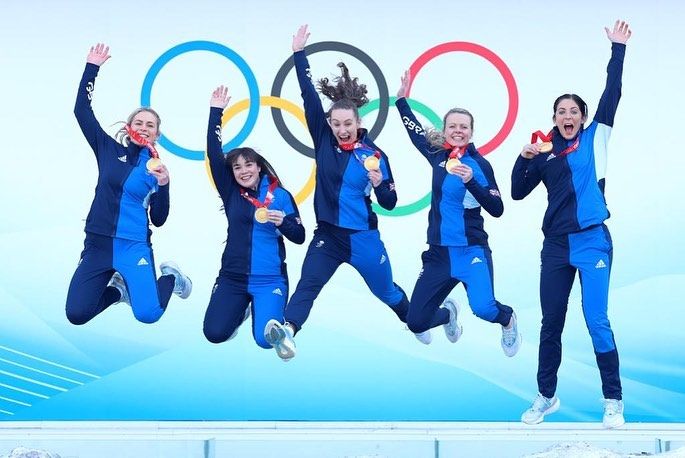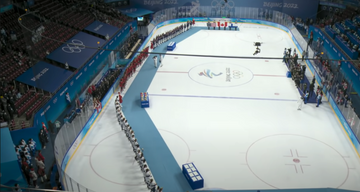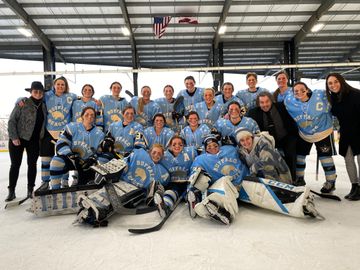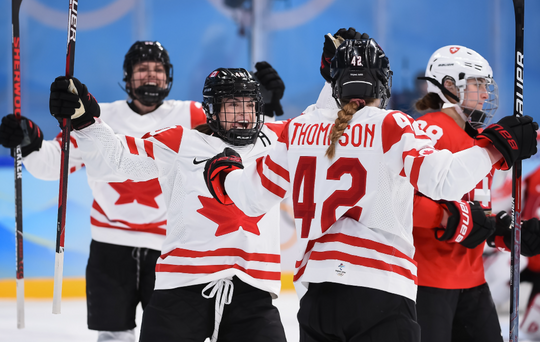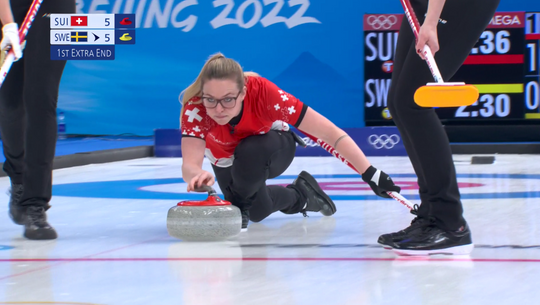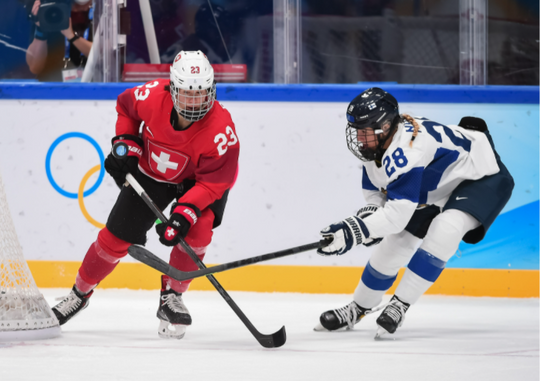Switzerland cruised to an 8-1 record to clinch the first spot in the medal round. The team skipped by Silvana Tirinzoni was joined by Sweden as Anna Hasselborg's team overcame early hiccups to finish the round robin portion with a 7-2 record.
At the Olympics, 4 losses typically means your tournament is over. But the women's tournament featured 3 teams (Canada, Great Britain, and Japan) with 5-4 records – and things got more complicated from there. To make matters worse, each team had a 1-1 record against the other 5-4 teams (Canada beating GB but losing to Japan, Japan beating Canada but losing to GB, Great Britain beating Japan but losing to Canada), so the pre-game draw to the button contest became the deciding factor. Before each round robin game, teams draw to the button to determine which team will start with hammer. When used as a tiebreaker, the average distance to the button is used to determine who advances. It’s not surprising that Canada's average distance from the button was the furthest of the three sides. The Jones rink started with hammer on only three occasions during the round robin. It meant that Japan and Great Britain advanced, and the Canadian team went home.
While the Canadians have long been vocal about their opposition to the draw to the button as a tie breaker (Canadian championships feature a tiebreaker game), the reality is the Jones rink could have won any of the four games they lost to avoid this fate. It’s a disappointing end to the tournament for the remarkable Jennifer Jones and if this is where her exemplary career ends it was a treat to see her once again embrace the role of legend and mentor for the sport.
So, with Canada eliminated, both Great Britain and Japan squeaked into the medal round and surprised in the semifinals. Taking on Switzerland, Japan's clutch shooting gave the 2018 bronze medalists the edge in an 8-6 nailbiter. What made the difference? Japanese skip Satsuki Fujisawa's double takeouts. This was particularly the case in the fifth end, when a clutch double takeout gave her team 4, and its first big end of the tournament. For the Swiss, their failure to capitalize with hammer was a huge problem, scoring multiple points in just one end despite controlling hammer at the start of the game. Tirinzoni's team was able to paper over this deficiency during the round robin (Switzerland had a last stone efficiency of just 29% through nine games) but couldn't deliver with medals on the line.
The Great Britain/Sweden semi-final was in a word, wild. GB came out on top with a 12-11 win on the strength of two big ends, scoring 4 in the first and ninth to cement the win. In a game where one score makes the difference, Britain's steal of one in 5 could certainly stake a claim as the turning point. Facing three, Sweden's Anna Hasselberg couldn't quite make the in-turn raise giving Britain a crucial point.
The gold medal game was a slow motion blow out. Having scored 2 in the first, Team GB added one in the fourth and stole one in the fifth after Fujisawa missed her last shot, a hit and roll, to lead 4-1 at the break. Forcing Japan to just one point in the sixth, Great Britain made full use of hammer in the seventh. With Japan unable to clear GB lead Hailey Duff's draws to the 4-foot all end, Muirhead's simple takeout had the British counting four and up 8-2. The teams played two more ends, but it was handshakes in 9 with GB up 10-3. It was another masterclass from Vicky Wright, who was the player of the tournament for me, but Japan will be disappointed with several uncharacteristic mistakes that hampered them in this game. Too many of their shots simply over-curled in the final.
Silver for Japan is still an improvement over the bronze medal the team won four years ago and for a rink just entering its prime, a sign of wonderful things to come. For Team Muirhead, the gold was not only GB's only gold of the Games, but also its second Olympic women's curling title, having won the women's tourney in Salt Lake City in 2002. Despite only being 31, it feels like this has been a long time coming for Muirhead, who burst onto the international curling scene with four World Junior Curling Championships (2007-2009, 2011) and a World Championship victory (2013) by age 23. But Muirhead has struggled with consistency since. Having overhauled her team over the last few seasons, and on the strength of the 2021 European Championship gold and her Olympic title, we can hope that Muirhead has finally found the recipe for sustained success at the top level.
Team of the Tournament
Lead: Dawn McEwen, Canada
While Yurika Yoshida of Japan and Sofia Mabergs of Sweden could have also claimed the honour, McEwen was the most consistent element of an inconsistent Canadian rink. She was second among leads with an 89.3% (trailing only Yoshida with 89.6%) and had the most games above 90% of any curler in the tournament with 5. Canada went home early, but not because of McEwen's play. She was terrific.
Second: Jennifer Dodds, Great Britain
With apologies to Esther Neuenschwander, who was simply excellent all week with an 83.1%, Jennifer Dodds' performance was most impressive for me. Dodds and mixed doubles partner Bruce Mouat had a disappointing finish to their tournament, losing by one to Norway before being blown out in the bronze medal game by Sweden. It wasn't just that they lost out on a medal despite being reigning world champions, it was also that Dodds struggled down the stretch of the doubles competition. That she turned things around to curl 81% through the round robin and then replicated that performance in the medal round of the women’s competition is a testament to her and just an impressive accomplishment after more than two weeks of grueling curling competition.
Third: Vicky Wright, Great Britain
It's less that Wright led all thirds through the round robin with a percentage of 81.5% (Nina Roth of the United States shot 80.7 through nine games and was equally as worthy) and more that Great Britain wouldn't have won gold without her. Wright's steadiness help mitigate skip Eve Muirhead's up and down performance and she out-curled her counterparts in the semifinals and final. It was the kind of clutch display you need from your third and the performance of the tournament for me.
Fourth stones/skip: Satsuki Fujisawa, Japan
Fujisawa had an excellent tournament, leading all skips with an 80.1% for the round robin, the only fourth to have a percentage in the 80s. While Japan was one of three teams with a 5-4 record and advanced on their last stone draw advantage, Fujisawa continued her strong performance in the medal round, out-curling her counterparts, Alina Pätz in the semi-final (77% to Fujisawa's 81%) and Muirhead in the final (78% to 80%).
(Photo: Eve Muirhead/Instagram)
